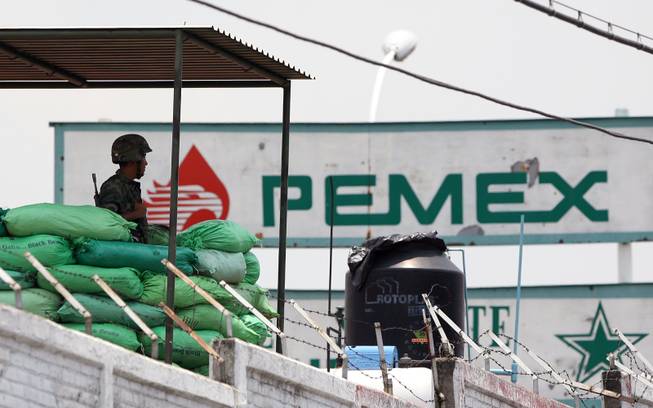
ASSOCIATED PRESS
A Mexican army soldier stands guard outside a Petroleos Mexicanos, Pemex, plant in Mexico City, July 11, 2007.
Monday, Aug. 12, 2013 | 4:50 p.m.
MEXICO CITY — President Enrique Pena Nieto unveiled a historic energy reform proposal Monday that he said would allow foreign companies to invest in Mexico's state-owned behemoth of an oil company without ceding state ownership of the country's petroleum resources.
"This is the moment to utilize all of our energy to move and transform Mexico," Pena Nieto said in a nationally televised speech from Los Pinos, the Mexican White House. "Petroleum and other hydrocarbons will continue to be the exclusive patrimony of the nation. We will continue being owners of the petroleum income."
Analyst John Padilla said the broad-strokes announcement appeared to allow foreign companies to engage in profit-sharing with Petroleos Mexicanos, or Pemex, the huge, underperforming and infamously dysfunctional state-owned oil company.
But Padilla said the proposal appeared to rule out production-sharing preferred by private companies, as it would allow them to take a portion of the oil.
Still, the proposal, if approved by lawmakers, "should attract investment," said Padilla, managing director of the international energy consulting firm IPD Latin America, though he noted that the success of the reform would be in the details that have yet to be unveiled.
The energy proposal is arguably the most important element of a package of reforms that Pena Nieto's government is hoping will transform Mexico into a more modern and efficient country. Pemex is responsible for about one-third of the government's income but is plagued by inefficiency and corruption. Production has been declining for nearly a decade, and if current trends are not reversed, the country could become a net energy importer by 2020.
For years, Mexico was blessed with huge amounts of oil that is in shallow waters and thus relatively easy to extract. With those supplies running out, however, analysts say Pemex needs the investment and expertise of foreign oil countries to help it go after deposits that are more difficult to get to, particularly in deep waters and in shale formations.
But the reform is sure to be complicated by the deeply held conviction among many here that the Mexican people's ownership of the country's petroleum resources, which is enshrined in the constitution, should not be altered or adulterated. The state ownership of petroleum has been a source of national pride since President Lazaro Cardenas expropriated foreign oil holdings and nationalized the industry in 1938.
Cardenas, a member of what is now the Institutional Revolutionary Party, or PRI, became a hero for his actions. Now Pena Nieto, who also represents the PRI, is facing criticism, particularly from his left flank, that he is trying to undo Cardenas' grand achievement.
So it was no accident that Pena Nieto described the reforms as conforming with Cardenas' great achievement and accessorized his speech with much pomp and fanfare. The ceremony opened with a singing of the national anthem, and Pena Nieto was accompanied by his entire Cabinet, each member of which was introduced by name and stood while being applauded. Pena Nieto received a standing ovation from the handpicked crowd.
Not present were top leaders of the opposition political parties, whose support Pena Nieto must have to pass his proposed legislation. The conservative National Action Party has introduced its own reform proposal, which would theoretically open the Mexican oil and gas sector to even greater foreign investment.
The liberal Party of the Democratic Revolution is expected to present a proposal as well.
Before the president's speech, Energy Minister Pedro Joaquin Coldwell laid out the argument for opening up Mexico's energy sector, including both oil exploration and electricity generation. With a rapidly changing market, he said, Mexico had to move to meet growing demands both abroad, in places like China, and at home. As it stands, he said, Pemex could only provide about half of the gasoline that Mexicans consume.
He said Mexico was losing billions of dollars a year in potential oil and gas production and had lost its ability to compete with other oil-producing countries. The vast resources that Mexico could tap require technology and expertise beyond what the nation has, he said.
"No country can venture into this alone," he said.
The proposed reform would change two articles of the Mexican Constitution, including Article 27, which states in part that "All natural resources in national territory are property of the nation."
Among other things, the proposal calls for restructuring Pemex, making it more transparent, and introducing fiscal reforms.

Join the Discussion:
Check this out for a full explanation of our conversion to the LiveFyre commenting system and instructions on how to sign up for an account.
Full comments policy